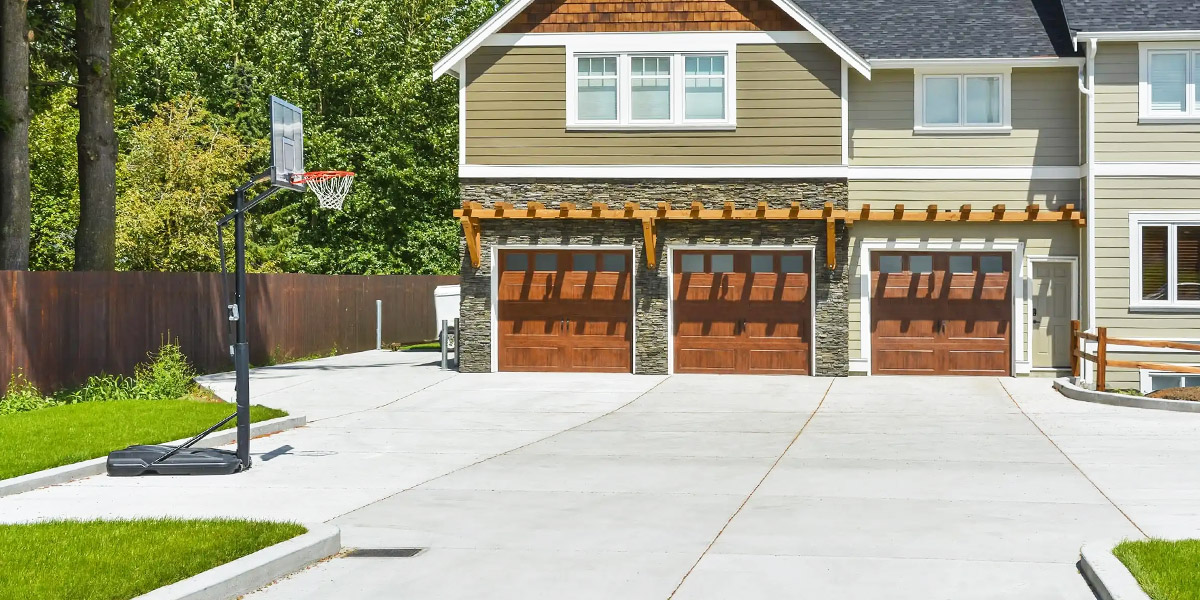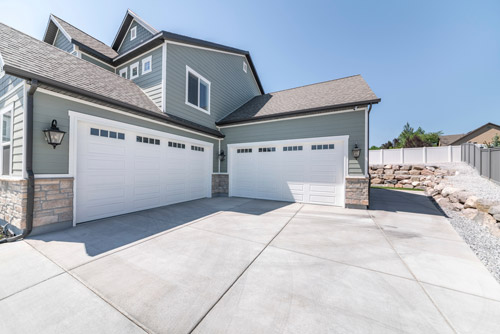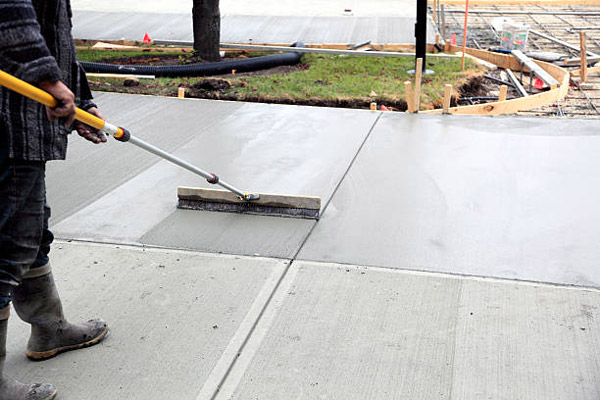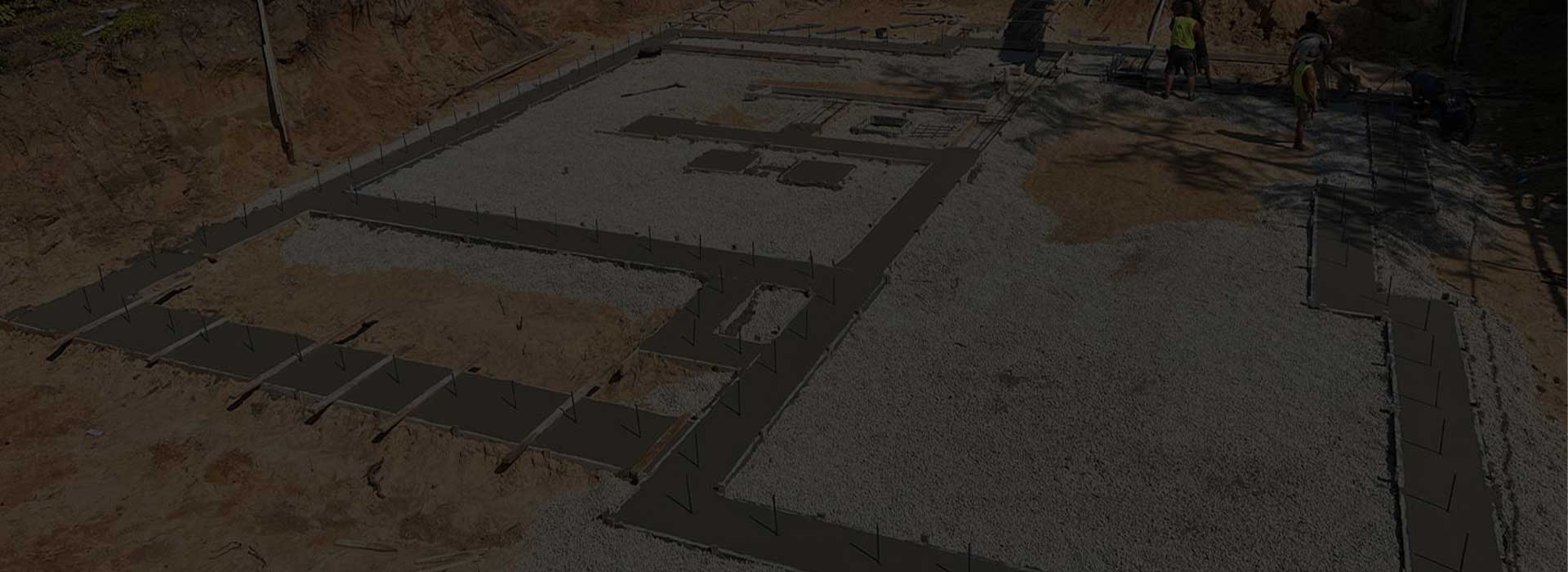
19 Sep How Long Does a Concrete Driveway Last?
Lifespan of a Concrete Driveway: What You Need to Know
A concrete driveway is an important investment for any homeowner. Concrete driveways provide the advantages of both functionality and aesthetic appeal to your property.
When properly installed and maintained, a concrete driveway can last for decades, often outlasting other driveway materials. But how long exactly can you expect your concrete driveway to last?
The average lifespan of a concrete driveway ranges from 25 to 30 years. However, with excellent care, some concrete driveways have been known to last up to 50 years or more.
Ready to schedule your concrete driveway installation with the Brother’s Concrete team? Call now at (920) 252-2204 or contact us online!

Factors that Contribute to a Long-Lasting Concrete Driveway
At least 4 different factors contribute to the lifespan of your concrete driveway. These include:
1. Quality of Installation
Proper installation is the key to a long-lasting concrete driveway! The quality of the materials and techniques used during installation can significantly impact the durability and performance of your driveway over the years. Several key factors contribute to a high-quality concrete installation:
- Concrete Mix: The right mix is essential for a strong and durable driveway. A high-quality concrete mix typically includes a balanced ratio of cement, water, aggregates (such as sand and gravel), and optional admixtures to improve performance. Using the correct water-to-cement ratio is crucial—too much water can weaken the concrete, while too little can lead to poor workability.
- Curing Techniques: Proper curing is vital to achieving maximum strength and durability in concrete. Curing involves keeping the concrete moist and at an optimal temperature during the initial hardening process. This prevents the concrete from drying too quickly, which can lead to cracking and surface defects. Techniques such as covering the concrete with plastic sheeting or using curing compounds help retain moisture and ensure even curing throughout the slab.
- Base Preparation: A well-compacted base is critical for preventing future issues like settling, cracking, and uneven surfaces. The base layer, typically made of gravel or crushed stone, should be adequately compacted to provide a stable foundation. If the subgrade (the soil beneath the base) is weak or not properly prepared, it can lead to the formation of voids beneath the concrete, causing it to crack or settle unevenly over time.
- Control Joints: Lastly, proper placement of control joints is essential to prevent random cracking. These joints allow the concrete to expand and contract with temperature changes and relieve stress at controlled locations. They should be spaced appropriately and cut to the correct depth to be effective.
2. Maintenance
Regular maintenance is key to maximizing the lifespan and appearance of your concrete driveway. While concrete is relatively low maintenance compared to other materials, neglecting routine concrete care can lead to premature wear and deterioration.
Here are some important maintenance practices to keep your driveway in top condition:
- Sealing: Applying a high-quality sealant every few years helps protect the surface of your driveway from moisture, chemicals, and other environmental factors. Sealing reduces the absorption of water, preventing freeze-thaw damage in colder climates and minimizing the risk of staining from oil, gas, and other substances.
- Cleaning: Regular cleaning prevents the buildup of dirt, debris, and stains, which can degrade the surface over time. Use a mild detergent and a pressure washer to remove grime, mold, and algae. Avoid using harsh chemicals, as they can damage the concrete.
- Crack Repair: Promptly repairing any cracks or surface damage is crucial to preventing more significant problems. Small cracks can allow water to penetrate the concrete, leading to erosion and further cracking. Use a high-quality concrete repair product to fill and seal these cracks before they expand.
- Avoiding Harsh Chemicals: De-icing salts and harsh chemicals can damage the surface of your driveway, especially in colder climates. Use alternative de-icing methods, such as sand or cat litter, to provide traction without harming the concrete.
3. Climate
Climate plays a significant role in determining the durability and lifespan of your concrete driveway. Different weather conditions can cause various forms of damage, from cracking to surface deterioration.
Understanding how climate affects concrete can help you take preventive measures to protect your driveway:
- Freeze-Thaw Cycles: In regions with cold winters, freeze-thaw cycles are a common cause of concrete damage. When water enters the pores and small cracks in the concrete and freezes, it expands, creating internal pressure. Repeated cycles of freezing and thawing can lead to surface flaking (spalling) and cracking. Using air-entrained concrete, which contains small air bubbles to absorb the pressure, can help mitigate this issue.
- Heavy Rainfall: Excessive water can weaken the subgrade, leading to settling and cracking. Proper drainage systems, such as sloped surfaces and drainage channels, are essential to direct water away from the driveway and prevent pooling.
- Prolonged Heat: In hot climates, prolonged exposure to high temperatures can cause the concrete to expand and crack. Applying a reflective sealant can help reduce heat absorption, keeping the concrete cooler and reducing the risk of thermal cracking.
- De-Icing Chemicals: In colder climates, using salt and other de-icing chemicals to melt snow and ice can lead to surface deterioration. These chemicals can penetrate the concrete and cause the surface to spall. Choosing a concrete mix with low permeability and using alternative de-icing methods can help protect your driveway.
4. Usage
The amount and type of traffic your driveway endures can significantly impact its longevity. While concrete is a strong and durable material, it is not invulnerable to damage from heavy loads and continuous wear.
Understanding how different types of usage affect your driveway can help you take steps to minimize stress and extend its life:
- Heavy Vehicles: While concrete driveways are designed to support the weight of standard passenger vehicles, repeated exposure to heavy vehicles such as trucks, RVs, and trailers can cause cracks and structural damage. If your driveway is expected to bear heavy loads regularly, consider using a thicker slab or reinforcing the concrete with rebar or wire mesh.
- Frequent Turning and Braking: High-stress actions like frequent turning, braking, and sudden stops can lead to surface wear and small cracks. This type of damage is especially common at the entrance and exit points of the driveway. Installing control joints in these high-stress areas can help manage cracking.
- Parking Practices: Avoid parking heavy vehicles in the same spot for extended periods, as this can create pressure points that lead to sinking or cracking. If parking large vehicles is necessary, consider placing plywood or rubber mats under the tires to distribute the weight more evenly.
- Spills and Stains: Chemicals such as oil, gasoline, and antifreeze can penetrate the surface of the concrete, causing staining and weakening the structure. Clean up any spills promptly to prevent long-term damage.

Concrete vs. Asphalt Driveways: Which Is Better?
When choosing a driveway material, homeowners often find themselves deciding between concrete and asphalt. Each has its own set of pros and cons, but concrete generally offers several advantages over asphalt, particularly when it comes to longevity and durability.
Advantages of Concrete Driveways
Concrete driveways offer several benefits, including impressive longevity, with a lifespan of up to 50 years with proper care, compared to the typical 20-year lifespan of asphalt. They are more durable, capable of withstanding heavy loads and traffic without significant damage.
Aesthetically, concrete provides greater design flexibility with various finishes, colors, and textures. It also requires less frequent maintenance, needing fewer sealings and easy repair of minor cracks. Additionally, concrete is eco-friendly, as it reflects more sunlight, contributing less to the urban heat island effect.
Advantages of Asphalt Driveways
Asphalt driveways are a cost-effective choice, generally less expensive to install than concrete, making them a popular option for budget-conscious homeowners. They can be installed quickly, allowing for faster use. Asphalt is also more flexible than concrete, reducing the likelihood of cracking under heavy loads or extreme temperature fluctuations.
We actually cover more of this topic in this article: concrete vs asphalt driveways: which should I choose?
Why Choose Us for Concrete Driveway Services?
When it comes to installing or repairing your concrete driveway, you need a reliable and experienced concrete contractor who understands the importance of quality workmanship. That’s where Brother’s Concrete comes in!
With years of experience in the industry, Brother’s Concrete has a proven track record of delivering top-notch concrete services. Our team of skilled professionals ensures every project is completed to the highest standards. We use only the best materials and techniques to ensure your concrete driveway is durable, attractive, and long-lasting.In addition, we pride ourselves on excellent customer service.
We work closely with our clients to understand their needs and preferences, ensuring the final result exceeds expectations. From new installations to repairs and maintenance, we offer a full range of concrete services to keep your driveway in optimal condition for years to come.
Contact Us
Investing in a concrete driveway installation is a decision that adds value and curb appeal to your property. With Brother’s Concrete, you can trust that your driveway will be built to last, enhancing your home for decades to come.
Contact us today to learn more about our concrete driveway services and how we can help transform your property! We proudly serve the areas of Wild Rose, Waupaca, Wautoma, and Steven’s Point, WI.

